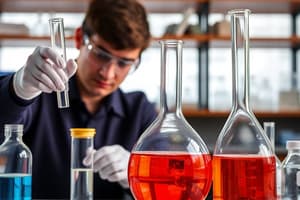Podcast
Questions and Answers
What is the primary purpose of wearing a lab coat in the biochemistry lab?
What is the primary purpose of wearing a lab coat in the biochemistry lab?
- To minimize contact with hazardous materials (correct)
- To look professional
- To keep warm
- To protect personal clothing
Which of the following is NOT allowed in the laboratory?
Which of the following is NOT allowed in the laboratory?
- Listening to instructions (correct)
- Storing personal items on lab benches
- Eating and drinking
- Using broken glassware
What should you always do when in doubt during a lab activity?
What should you always do when in doubt during a lab activity?
- Ask for help (correct)
- Guess the answer
- Continue with caution
- Consult your friends
How should laboratory glassware be maintained?
How should laboratory glassware be maintained?
Why is it important to avoid side talks in the lab?
Why is it important to avoid side talks in the lab?
What should be done with food and drinks while working in the lab?
What should be done with food and drinks while working in the lab?
What is the appropriate action when handling flammable materials in the lab?
What is the appropriate action when handling flammable materials in the lab?
Which practice helps ensure the safety of all individuals in the lab?
Which practice helps ensure the safety of all individuals in the lab?
What should you use to handle hot glassware safely?
What should you use to handle hot glassware safely?
Why is it important to point test tubes away from yourself and others when heating?
Why is it important to point test tubes away from yourself and others when heating?
What should you do with used reagents after an experiment?
What should you do with used reagents after an experiment?
What action should you take if you encounter non-properly working equipment during an experiment?
What action should you take if you encounter non-properly working equipment during an experiment?
What is a pipette primarily used for in a laboratory?
What is a pipette primarily used for in a laboratory?
In case of an eye injury in the laboratory, what is the first step you should take?
In case of an eye injury in the laboratory, what is the first step you should take?
What is the recommended action in the event of fainting in the lab?
What is the recommended action in the event of fainting in the lab?
What distinguishes an automatic pipette from a glass graduated pipette?
What distinguishes an automatic pipette from a glass graduated pipette?
Flashcards are hidden until you start studying
Study Notes
Lab Safety Procedures
- Lab is a place for serious work and careless behavior is not tolerated
- Safe working protects: yourself, other lab workers, cleaners, visitors and your work
- Appearance in lab includes: wearing clean white coat, placing personal items in bag or cabinet, only lab manuals allowed in the lab, eating and drinking not allowed, not sitting on lab benches, listening carefully to instructor, reading instruction guide before performing experiments and avoiding side talks
- General work procedure: in doubt, ask, do not guess, wear approved safety goggles or glasses as instructed, wear gloves if handling blood specimens, only use clean and dry glassware, check glassware for cracks, use flame with extreme caution, keep head and clothing away from flame, never carry flammable or hot and dangerous equipment or chemicals through the lab, handle hot glassware with holder or tongs, always point test tubes away from self and others when heating, never taste anything or touch chemicals with hands, never pour used reagents back into the bottle, keep lids on bottles and containers when not in use, inform instructor immediately about any non properly working equipment or any difficulty
- Hygiene Practices include: keeping hands away from face, eyes and clothes during lab, cleaning laboratory area before leaving (including table-tops, returning equipment to original location, and cleaning spills immediately)
- Emergency procedure: in case of an accident as acid or alkali burns, wash the affected area immediately with plenty of running water, in case of eye injury, flush eyes immediately with plenty of water for at least 15 minutes, in case of fainting provide fresh air and keep the head lower than the rest of the body, inform supervisor immediately about any problem or accident in the lab
- Hazards in biochemical lab can be identified by understanding signs
Lab Instruments and Apparatus
- Instruments for Liquid Volume Measurements: The smaller the diameter of the instrument, the more accurate the measurement (e.g. pipettes)
- Pipettes measure and deliver exact volumes of liquids
- Glass graduated pipettes are used to transfer small volumes of liquids (e.g. 1ml-10ml)
- Automatic pipettes are the most accurate type and used to transfer microvolumes of liquids (e.g. 1μl-1000μl)
- Graduated cylinders are used to measure different volumes of liquids
Studying That Suits You
Use AI to generate personalized quizzes and flashcards to suit your learning preferences.




